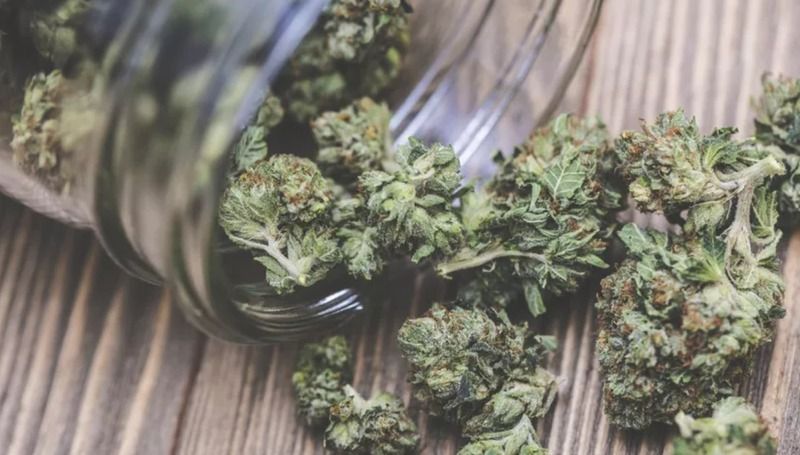Is marijuana a depressant or a stimulant? Its therapeutic benefits have helped millions of people around the world feel better and relax. However, everyone reacts to marijuana differently depending on their tolerance and the type of cannabis they consume. You can buy this product in our boutique.
In some cases, marijuana may be classified as a depressant or a stimulant. We go through what stimulants and depressants are and how marijuana might be used to treat both in this article. We also cover the dangers and negative effects of marijuana, as well as safe cannabis use.

What is Marijuana?
For millennia, marijuana has been used for medicinal and recreational purposes. The dried and cured harvested flowers are generally taken in a variety of ways, including inhalation, ingestion, topical application, and sublingually.
Marijuana is a source of therapeutic benefits, including relaxing and euphoric effects. Many states have legalized marijuana for medical use in limited circumstances, such as chronic pain, cancer, epilepsy, anxiety, PTSD, and other diseases.
What Are the Effects of Marijuana?
Marijuana has a wide range of effects, some more unpleasant than others. It has the ability to produce euphoria and relaxation when appropriately used. Other mental and physical consequences include altered time perception, enhanced sense of touch, improved appetite, and positive emotions.
In certain situations, marijuana may be classed as a depressant, stimulant, and hallucinogen.
What Is a Depressant?
A depressant is a chemical that lowers and calms functional and emotional activity such as anxiety and panic. Prescription drugs are depressants because they have the potential to be abused, although they can also be used for therapeutic purposes. Alcohol, barbiturates, and Xanax are all examples of depressants.
Cannabis has a relaxing effet on the muscles and nerves, which may help you unwind. Tolerance to THC develops with time, thus you’ll need more of it to get the same results. You can also become reliant on marijuana if you use it regularly.
Depressants are medicines that induce a sense of calm. They can help with anxiety and muscular tightness, making people feel sleepy.
When you consume alcohol, it slows down brain activity and has a calming effect on the central nervous system.
The depressant effects of marijuana include:
- feeling relaxed
- feeling less anxious
- aiding sleep
The adverse side effects of depressants include:
- slurred speech
- confusion
- dizziness
- slowed breathing
- memory problems
- poor concentration
What Is a Stimulant?
A stimulant is something that energizes or stimulates you. It may improve your mood and attention. Cocaine, Adderall, and methamphetamine are examples of stimulants. Stimulants are powerful psychoactive drugs that can raise blood pressure and heart rate.
Cannabis has a sedative effect, which leads to drowsiness and reduced heart rate. Cannabis is sometimes classified as a stimulant since it makes you feel more awake, energetic, and happy, especially after ingestion. Marijuana’s mood-lifting qualities can lead to dependence in some people.
Stimulants are chemicals that increase alertness and mood by stimulating the brain’s dopamine and norepinephrine receptors.
Dopamine influences a person’s mood, while norepinephrine affects:
- blood vessels
- blood pressure
- heart rate
- blood sugar levels
- breathing
Stimulants, including marijuana, might also produce a euphoric or haut sensation as a result of the dopamine-boosting properties of these substances.
Stimulants also cause physical symptoms, typically increasing the:
- blood pressure
- heart rate
- breathing rate
Side effects of stimulants may include:
- restlessness
- anxiété
- panic attacks
- paranoia
What Is a Hallucinogen?
Hallucinogens change how neurons communicate between one another and the brain. Hallucinations are false perceptions of reality. As a consequence, a user may experience altered perceptions of reality and see visual, olfactory, auditory, tactile, and/or mental hallucinations as a result of using this drug. LSD and MDMA are examples of hallucinogens.
Hallucinogens are medications that alter a person’s sense of reality. They may have these side effects as a result of their mood-elevating properties, which are due to increased levels of serotonin in the frontal cortex of the brain, which is responsible for emotion, perception, and thinking.
Marijuana may, therefore, cause someone to have heightened sensory perception, resulting in them:
- seeing brighter colors
- hearing sounds differently
- being more sensitive to touch
Some people may find enhanced sensory perception to be a pleasurable form of hallucination.
Hallucinogens can also cause more intense symptoms that may be distressing. The possible adverse side effects of these drugs include:
- nausea
- increased heart rate
- paranoia
- powerful hallucinations
Is Marijuana a Stimulant or Depressant?
Is cannabis a depressant or a stimulant? The fact is that marijuana’s position in these categories isn’t as straightforward as you may believe. Effects can differ from one person to the next, and different strains have unique effects.
Hallucinogens generate false perceptions of events, senses, and objects. Many people believe that cannabis causes hallucinatory effects, yet they are actually uncommon. That said, time distortion is a kind of hallucination that may occur after marijuana usage.
As a result, the correct answer to “is cannabis a depressant or a stimulant” is that it depends on the individual and the souche. Some individuals experience calm and drowsy, while others are more energetic and awake.
Marijuana is a complicated drug, and its effects can vary greatly. Depending on the type of marijuana and the chemicals it interacts with in a user’s body, it may function as both a depressant and a stimulant at times. Marijuana, however, has an effect on a user’s attention span, long-term memory storage, and psychomotor abilities such as driving a car in general. Marijuana use for a long period of time or on a regular basis has been linked to the development of psychotic episodes in persons who are more sensitive to its effects and can cause irreversible damage to brain regions that affect normal mental functioning. Because marijuana contains over 400 active compounds, researchers are still looking for direct connections between it and users. However, according to some studies, marijuana is more of a depressant than a stimulant, with cannabis smokers suffering from depression at a higher rate than non-smokers. While the long-term effects of marijuana are still being studied, any intake of the drug has an impact on the body’s natural condition, which can always lead to problems in normal function.
Another reason why marijuana’s effects aren’t predictable is that each user’s body responds differently to the strain they consume. Each individual has a different natural level of neurotransmitters in their brain, and these neurotransmitters are essential for mood regulation. Marijuana tends to disrupt the natural rhythm of these chemicals, making it impossible to determine how and by how much they are altered.

